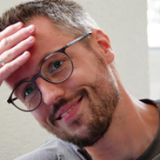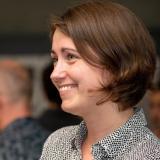Decoding your Thoughts: Can AI read your Mind?
It has recently been demonstrated that Artificial Intelligence can recover the meaning of perceived and imagined language from non-invasive brain recordings. Is this just clever engineering or should we be worried that AI will soon be reading our minds? (English / SG-Certificate*)
Time: 16:45-18:30 hrs.
Admission is free, no registration required.
Into the corners of our minds
Picture this: you're sitting in a cozy armchair, thinking about how amazing it would be to sip on your favorite beverage, and voila! Your phone automatically places a home delivery order at your favorite local barista, seamlessly translating your thoughts into actions. Just think it, and AI will do the rest. Such a personal thought-to-text translator is obviously still very much science fiction, but new technological advancements in AI have brought this scenario a bit closer. Researchers from the University of Texas in Austin have succeeded in using artificial intelligence to extract text from the brain activity of individuals. They developed a specific algorithm, which was trained using fMRI brain scans of participants listening to podcasts for up to 16 hours. In subsequent tests, the decoder was able to generate text that closely approximated the content of a story the participants listened to.
Debating the ethical issues
While not being true mind-reading yet, it resembles something eerily close. The method therefore immediately raises ethical questions, especially regarding invasion of privacy, consent, autonomy, misinterpretation and manipulation. But also think of security issues: what if thought-decoding technology falls into the wrong hands? However, it could also be put to good use, for example to communicate with people with locked-in syndrome, or for making mental health diagnoses more precise, expanding the boundaries of human communication.
Symposium
Join us at this symposium, during which we will explain the possibilities and impossibilities of AI ‘mind-reading’, demystifying the neuroscience behind the "brain decoding" of language. We will explore all the steps involved in the mapping of brain activity to linguistic meaning, showing how a clever combination of neuroimaging methods, large language models, and machine learning, allows for the decoding of paragraphs of continuous language. Not only when people listen to short stories, but also when they imagine them, or when they watch silent videos. Next to this, we will look into whether the established framework of human rights is able to offer adequate protection to the autonomy over our minds. Are novel human rights, like a right to mental self-determination, perhaps necessary? Should they include protection from unconsented interferences with the mind, instead of only protecting the body, as is currently the case? And what about the philosophical and ethical issues that arise from the use of neural technologies and brain–computer interfaces to perform so-called "mind-reading"? In particular, how do current results impact debates about the nature of the mind? And how do these debates highlight concerns about how scientists and science-communicators effectively disseminate their results to the public? Noortje Venhuizen will be the moderator of this symposium.
Speakers
-

Harm Brouwer
Associate Professor, Cognitive Science and Artificial Intelligence Department (Tilburg University)Harm Brouwer is a computational Cognitive Neuroscientist researching language comprehension. He is also the Principal Investigator of the Neurocomputation of Language lab at Tilburg University. In his research, Harm combines neurocomputational modeling with empirical experimentation to investigate the neural basis of language. He has a PhD in Cognitive Science and a Master in Behavioral and Cognitive Neurosciences from the University of Groningen (both Cum Laude).
-

Sjors Ligthart
Assistant Professor, Criminal Law department (Tilburg University)Sjors Ligthart is assistant professor of criminal law at Tilburg University and postdoctoral researcher at the Willem Pompe Institute, Utrecht University. In 2016, Sjors received his master’s in criminal law cum laude at Tilburg University. In 2021, he defended his PhD thesis on coercive brain-reading in criminal justice and received his doctoral degree cum laude, also at Tilburg University. His thesis has been published as a monograph by the Cambridge University Press (2022).
-

Nathan Wildman
Assistant Professor, Philosophy Department (Tilburg University)Nathan Wildman teaches Logic, Philosophy of Language and Digital Aesthetics at the Department of Philosophy (Tilburg School of Humanities and Digital Sciences). He is also a member of TiLPS – the Tilburg Center for Logic, Ethics, and Philosophy of Science. Prior to coming to Tilburg, he was a University Lecturer in Philosophy at the University of Glasgow and Hamburg. His research interests include interactive fiction, metaphysics, videogames, imagination & make-believe and virtual reality.
-

Noortje Venhuizen
Assistant Professor, Cognitive Science and Artificial Intelligence Department (Tilburg University)Noortje Venhuizen is assistant professor at the Department of Cognitive Science and Artificial Intelligence, Tilburg School of Humanities and Digital Sciences. She is interested in formal (symbolic/ distributional/ probabilistic) models of linguistic meaning and how they can be applied and evaluated, using cognitive modeling, behavioral experiments, and computational methods in natural language understanding. Her expertise lies in computational semantics, AI, linguistic meaning, and cognitive modeling.
Contact
This symposium is organized by Studium Generale in cooperation with study associations Sapientia Ludenda, Enigma and ELSA.
Contact: Hannah van den Bosch (Studium Generale).
* For students, this lecture may count towards the SG-Certificate. Check the SG-Certificate website for all the terms and conditions.
